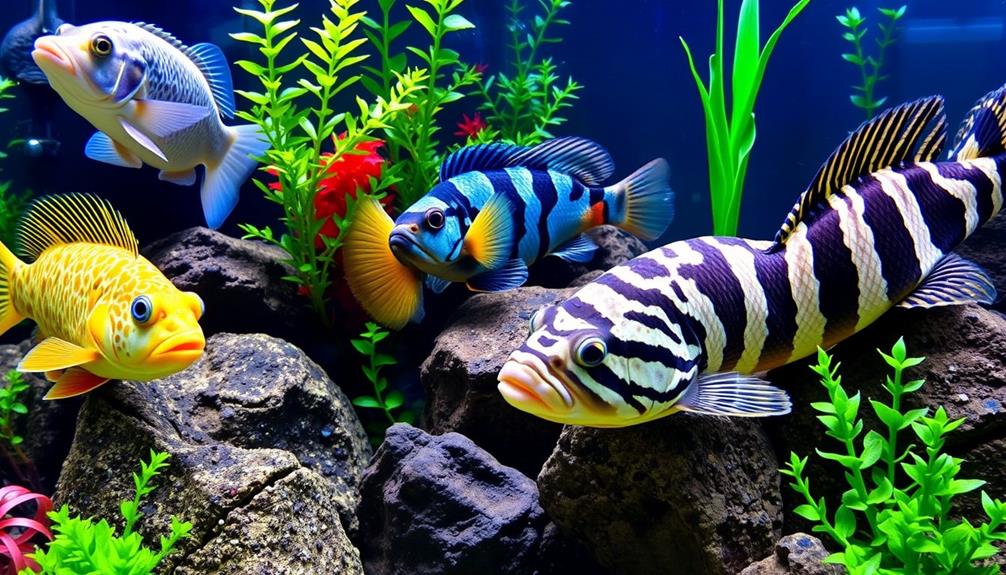Hedgehogs are fascinating pets, known for their curious and shy personalities. These nocturnal creatures need patience to build trust, as they prefer limited social interaction. To keep them happy, provide a spacious habitat of at least 6 square feet with proper bedding and an exercise wheel. Their diet should mainly consist of high-quality hedgehog food and live insects. Remember, these pets carry salmonella, so practice good hygiene after handling them. Understanding their unique traits and care requirements is essential for responsible ownership. Stick around to uncover more insights on creating the perfect environment for your hedgehog.
Key Takeaways
- African pygmy hedgehogs are nocturnal, requiring owners who can interact during their active hours for bonding and engagement.
- They need a spacious habitat of at least 6 square feet, with appropriate bedding, an exercise wheel, and toys for stimulation.
- A balanced diet of high-quality hedgehog food and live insects is essential, with regular monitoring to prevent obesity.
- Regular hygiene practices, including weekly cleaning and annual vet checkups, are crucial for maintaining health and preventing illness.
- Understanding local laws regarding hedgehog ownership is vital, as they are illegal in some regions like California and New York City.
Understanding Hedgehog Characteristics
When you immerse yourself in the world of hedgehogs as pets, it's important to grasp their unique characteristics.
Hedgehogs, particularly the African pygmy variety, have specific needs and personality traits that must fit your lifestyle for successful care. These small creatures boast 3,000 to 5,000 quills made of keratin, serving as a defense mechanism against predators. When feeling threatened, they curl into a tight ball, raising their quills as a protective measure.
Understanding their unique behavior can be compared to examining astrological compatibility in relationships, as both require a thoughtful approach to build trust.
Being nocturnal, hedgehogs are most active at night, which may not align with your daily routine. If you're seeking a pet that's active during the day, a hedgehog mightn't be the best fit.
Additionally, hedgehogs are solitary animals in the wild, requiring patience and gentle handling for trust to develop. They thrive on limited social interaction, so understanding their solitary nature is vital for fostering a bond.
Hedgehog Behavior and Intelligence
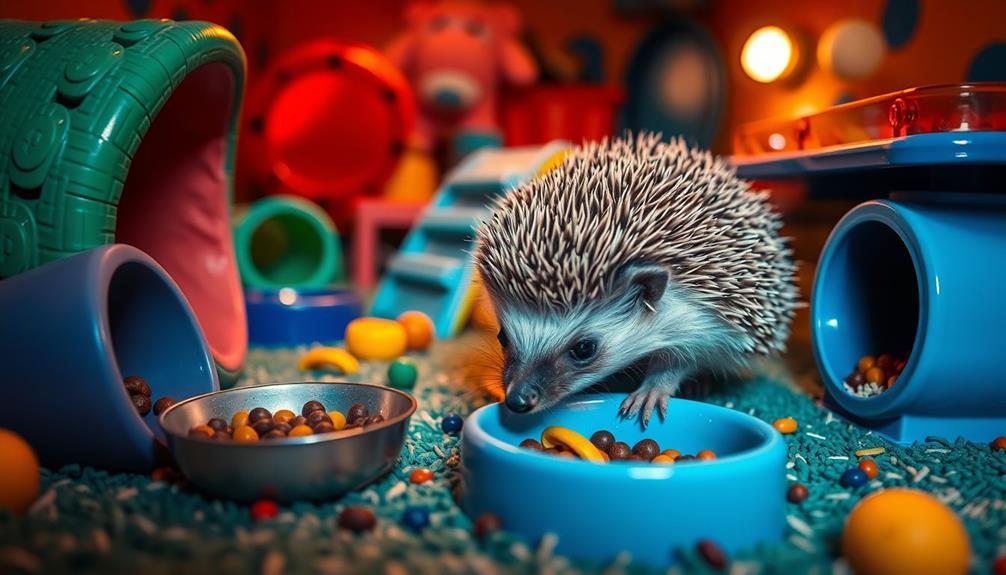
Understanding hedgehogs' characteristics lays the groundwork for appreciating their behavior and intelligence. These little creatures display intelligence comparable to hamsters, demonstrating basic learning and problem-solving skills. You might find that with patience, your hedgehog can learn to navigate simple mazes or respond to cues during playtime.
To foster a more engaging environment, consider incorporating activities that stimulate their minds, much like family activities that promote creativity for children.
Hedgehog behavior is fascinating, especially considering their nocturnal nature. They're most active at night, engaging in exploration and exercise during these hours. You'll likely enjoy watching them scurry around, curious about their surroundings. When content, hedgehogs communicate through low purring sounds, giving you a glimpse into their emotional state.
While wild hedgehogs tend to be solitary and shy, pet hedgehogs can develop trust with gentle handling and patience. As you bond with your pet, you may notice their playful side emerge. They often engage in endearing antics, like stealing shoelaces and socks, reflecting their curious nature and need for stimulation.
Embracing this playful behavior not only enriches their lives but also strengthens the connection between you and your hedgehog.
Care Requirements for Hedgehogs

Creating a suitable environment for your hedgehog is vital for their well-being. To guarantee your pet hedgehog thrives, you need to meet their care requirements effectively. Here are three key aspects to focus on:
1. Spacious Enclosure: Provide at least 6 square feet of space for your hedgehog. This room allows for roaming and exercise, which they'll love.
Just like with dogs, making sure they've enough space to move around is vital for their mental and physical health. Consider incorporating toys or tunnels to stimulate their curiosity, similar to how you'd enrich your dog's environment with various activities.
2. Nutritious Diet: To keep your hedgehog healthy, feed them a balanced diet. Low-fat dry cat food is a staple, but don't forget to supplement it with live insects like mealworms and crickets.
Occasionally, you can treat them with scrambled eggs or vegetables. Just as with dogs, providing a balanced diet is important to avoid health issues, so make sure to research dog nutrition guidelines for insights on proper feeding.
3. Temperature Control: Hedgehogs prefer a warm environment, ideally between 75 to 85 degrees Fahrenheit. Monitor their habitat to avoid temperature extremes, as this can affect their health.
Lastly, remember to clean the enclosure weekly with odorless products and use bedding materials like towels or fleece that are easy to wash.
Health and Safety Concerns
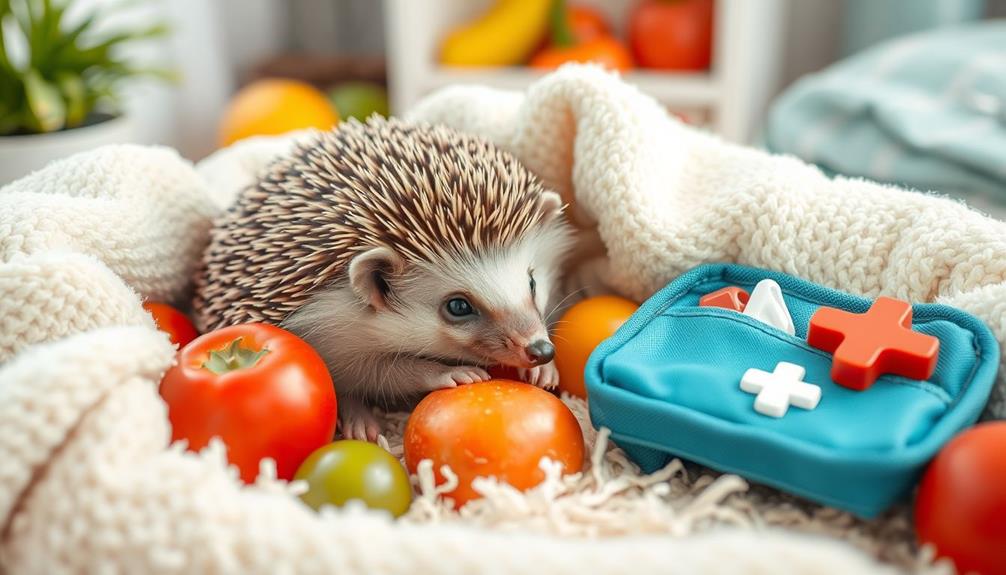
Hedgehogs can be charming companions, but their unique health and safety concerns require your attention. One major concern is that hedgehogs can carry salmonella, which makes hand hygiene vital after handling them. Always wash your hands thoroughly, especially if you have young children or seniors in your home.
To minimize germ transmission, avoid close contact like kissing or snuggling with your hedgehog. Additionally, understanding the importance of mental health support can help pet owners manage any stress related to pet care.
Regular cleaning of a hedgehog's enclosure is essential. You should clean their cage and supplies outside when possible to reduce contamination risks inside your home. This practice helps maintain a healthy environment for your pet and your family.
While hedgehog bites are generally minor, they can occur if you handle them improperly. Be cautious, as quill punctures can happen, causing minor injuries that require monitoring.
Additionally, schedule annual checkups with an exotic pet vet to keep an eye on your hedgehog's health. These visits help address common issues such as obesity, liver disease, and potential respiratory problems, ensuring your pet remains happy and healthy.
Legal Considerations for Ownership
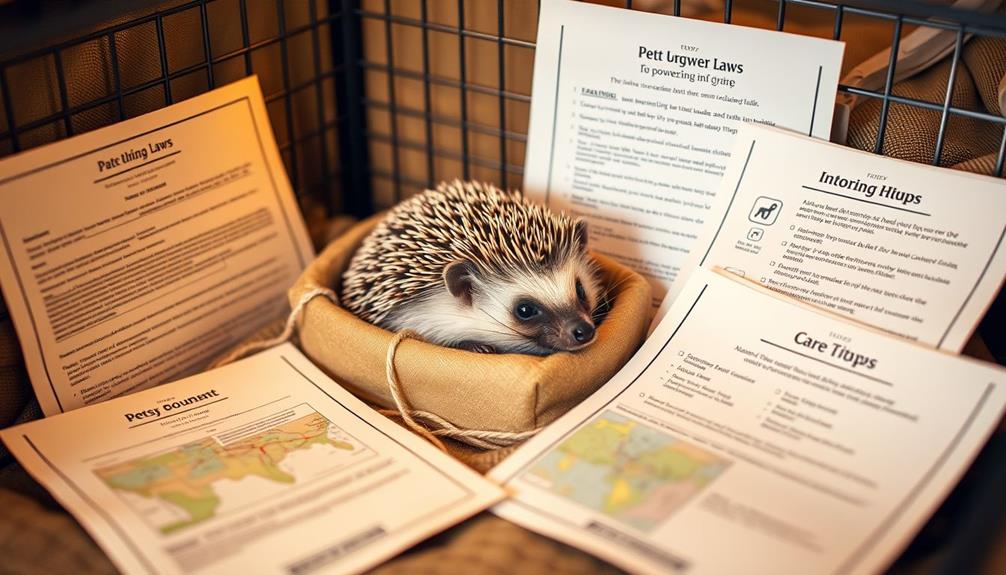
Before bringing a hedgehog into your home, you need to check the laws in your state, as ownership is illegal in several places, including California and New York City.
It's important to understand the potential legal implications of pet ownership, as well as the ecological impact of keeping these pets, since releasing them into the wild can harm local wildlife.
Make sure you're fully informed to avoid any legal trouble and guarantee the well-being of your future pet.
Regional Ownership Regulations
When considering a hedgehog as a pet, understanding regional ownership regulations is vital to confirm you're compliant with local laws.
Hedgehogs can make great pets, but it's important to know where ownership is legally permitted. In several locations like California, Georgia, New York City, and Pennsylvania, owning a hedgehog is prohibited due to ecological concerns.
Additionally, it's wise to be aware of the potential risks associated with pet ownership, as highlighted in background checks for safety.
Here are three key points to keep in mind:
- Check Local Laws: Always verify local laws before purchasing a hedgehog to make sure you're not violating any regulations.
- Research Breeding and Sale Regulations: Some regions have specific rules regarding the breeding and sale of hedgehogs, so do your homework.
- Rehoming Guidelines: If you ever need to rehome your pet, remember that releasing hedgehogs into the wild is illegal and harmful to local ecosystems.
Ecological Impact Considerations
Understanding the ecological impact of owning a hedgehog is essential for responsible pet ownership. While hedgehogs are solitary animals and can make delightful companions, it's important to evaluate the legalities surrounding their ownership. In several states, like California and Georgia, owning a hedgehog is illegal due to the potential impact on local ecosystems if they're released into the wild.
Additionally, owning a hedgehog can offer benefits such as a unique pet experience, but it also comes with the responsibility of understanding the risks involved and guaranteeing their well-being.
Releasing a pet hedgehog can disrupt native wildlife and habitats, leading to unintended consequences. The African pygmy hedgehog, the most popular pet species, may not fit well into your local environment if it escapes or is abandoned. As a result, before acquiring one, you must check your local regulations to confirm you're not breaking any laws.
If you find yourself unable to care for your hedgehog, don't think about releasing it outside. Instead, reach out to local animal rescues for rehoming assistance.
Bonding With Your Hedgehog

Building a bond with your hedgehog takes time and patience, as these solitary creatures are often shy and cautious around humans. If you're willing to invest effort, you'll find that your hedgehog can become a loving companion.
It's important to understand that, much like cats, hedgehogs can develop emotional connections with their owners over time. Remember, young hedgehogs adapt more easily, so if you're starting with a baby, you'll have an advantage.
Emotional attachment in pets is something to keep in mind as you work on your relationship.
Here are three tips to help you bond with your pet:
- Gentle Handling: Start by handling your hedgehog gently. Allow them to sniff your hands before picking them up. This helps them feel safe and secure.
- Exploration Time: Let your hedgehog explore their environment. Create a safe space where they can roam. This encourages trust and makes them more comfortable with you.
- Consistent Interaction: Regularly interact with your hedgehog, especially during their active nighttime hours. Consistency is key to building a bond with a pet.
With patience and a gentle approach, you'll notice your hedgehog becoming less shy and wary, eventually showing signs of contentment, like low purring sounds.
Enjoy the journey of building your unique bond!
Creating a Suitable Habitat

Creating a comfortable habitat for your hedgehog is vital to their well-being. To start, make certain you're creating a suitable habitat with a minimum enclosure size of 6 square feet. This size allows hedgehogs to roam and explore, catering to their natural instincts. If possible, opt for a larger space, as it contributes to their overall happiness and health.
Incorporating elements that encourage physical activity and motor skills can also enhance their environment. Temperature is essential, too. Keep their habitat between 75 to 85 degrees Fahrenheit to guarantee they stay comfortable and healthy. Avoid extreme temperatures that can stress them out.
When it comes to bedding, choose materials like towel or fleece, as they're easy to wash and provide a cozy environment. Additionally, incorporate an exercise wheel in the enclosure. Hedgehogs need physical activity, especially since they're nocturnal and thrive at night.
Regularly cleaning the enclosure is important as well; aim for at least once a week and use odorless products to maintain hygiene and prevent unpleasant smells. By following these guidelines, you'll create a suitable habitat that promotes the well-being of your hedgehog and allows them to thrive in your care.
Feeding and Nutrition Guidelines
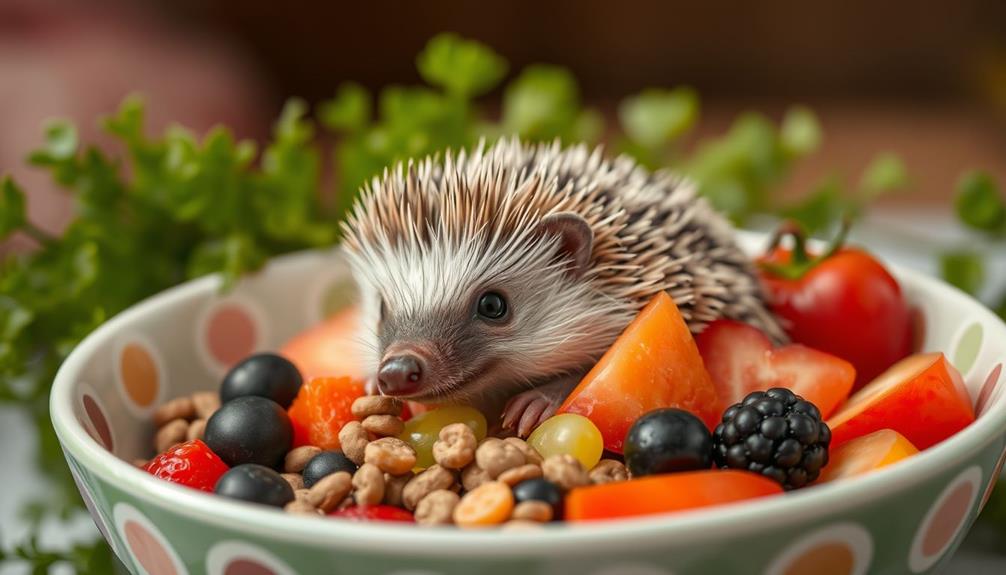
When it comes to feeding your hedgehog, a balanced diet is key to their health.
You'll want to avoid common dietary mistakes, like overfeeding or relying too heavily on treats. Incorporating high-quality commercial hedgehog food and supplementing with insects can provide the necessary nutrients for your pet.
Additionally, being mindful of their protein intake is essential to prevent obesity, similar to how regular trims are recommended for maintaining healthy hair in humans hair maintenance tips.
Let's explore the essentials of their nutrition to keep your little friend happy and thriving.
Balanced Diet Essentials
Providing a balanced diet for your hedgehog is fundamental for their overall health and well-being. A proper diet helps keep your pet active and happy, guaranteeing they thrive as a healthy hedgehog.
Here are some key components to take into account:
- Dry Cat Food: Choose 2 to 3 types of meat-rich dry cat food with a fat content under 10%. This guarantees your hedgehog gets adequate protein and essential nutrients.
- Live Foods: Supplement their diet with live foods like crickets, mealworms, and cockroaches. These not only provide essential protein but also add enrichment to their meals, making feeding time exciting.
- Occasional Treats: You can offer treats like scrambled eggs, peas, and broccoli, but remember to limit these to no more than 10% of their overall food intake.
Always make certain fresh water is accessible and change it regularly to prevent contamination.
Monitoring your hedgehog's diet is important to avoid health issues like obesity and liver disease. By prioritizing a balanced diet, you're fulfilling your pet's needs and contributing to their long-term health.
Common Dietary Mistakes
What common mistakes do hedgehog owners make when it comes to feeding their pets? Many tend to overfeed high-fat foods, leading to obesity and serious health issues. It's essential to provide a balanced diet primarily consisting of high-quality, low-fat dry cat food. Additionally, neglecting dietary diversity can result in nutritional deficiencies.
Here's a table to help you identify common dietary mistakes and how to correct them:
| Mistake | Consequence | Solution |
|---|---|---|
| Overfeeding high-fat foods | Obesity, liver disease | Stick to low-fat, high-protein cat food |
| Ignoring live food supplements | Lack of nutrition | Limit live food to 20% of diet |
| Giving too many treats | Weight gain | Offer treats like eggs and broccoli sparingly |
| Not providing fresh water | Dehydration | Change water daily and keep it fresh |
| Feeding only one type of food | Nutritional deficiencies | Guarantee a varied diet for overall health |
Common Misconceptions About Hedgehogs

Despite their charming appearance, hedgehogs come with a set of misconceptions that can lead to misunderstandings about their care and behavior. Many people think hedgehogs are cuddly and social, but they're actually solitary creatures. Building trust with them requires patience and time.
Here are three common misconceptions to keep in mind:
- Size Matters: Hedgehogs require larger enclosures—at least 6 square feet—to roam and explore naturally. Small cages don't provide the space they need to thrive.
- Not Just Cute Quills: People often confuse hedgehogs with porcupines due to their spines. However, hedgehogs aren't related to porcupines, and their quills are made of keratin, serving as a protective mechanism rather than a weapon.
- Individual Personalities: You might think all hedgehogs are easy to handle, but their temperament can vary. Some are shy or feisty, depending on their individual personality and past experiences.
Understanding these truths about common species of hedgehogs can help you be better prepared, playing the extra effort needed for responsible pet ownership.
Tips for Responsible Hedgehog Ownership

Before bringing a hedgehog home, you need to research local regulations to guarantee they're legal in your area.
Once you're clear on the laws, focus on creating a proper habitat that meets their space and activity needs.
Research Local Regulations
When considering bringing a hedgehog into your home, it's vital to research local regulations, as ownership may be illegal in certain areas like California, Georgia, and New York City.
Understanding your region's laws helps you avoid legal issues and guarantees you practice ethical ownership.
To get started, follow these steps:
- Check Local Laws: Look up your city or state's regulations regarding hedgehog ownership. Some places may require specific permits or have outright bans.
- Contact Animal Rescues: Reach out to local animal rescues or organizations for guidance. They can provide insights on legal requirements and may even have hedgehogs available for adoption.
- Consider Future Care: If you can no longer care for your hedgehog, it's important to have a plan.
Releasing domesticated hedgehogs into the wild can disrupt local ecosystems, so always seek proper rehoming options.
Proper Habitat Setup
Once you've confirmed your ability to legally own a hedgehog, setting up their habitat becomes a top priority. Start by ensuring you provide a minimum enclosure size of 6 square feet, but larger spaces are even better to accommodate their natural roaming instincts.
Hedgehogs thrive in a temperature range of 75 to 85 degrees Fahrenheit, so keep an eye on the climate to avoid extremes.
For bedding, opt for materials like towel or fleece, as these are easy to wash and help control odors. Avoid cedar or pine shavings, which can pose health risks.
Regularly clean the enclosure—ideally once a week—using odorless products to maintain a healthy living environment.
Don't forget to include an exercise wheel and toys in your hedgehog's setup. These nocturnal creatures need stimulation during their active hours to prevent boredom and promote physical activity.
Health Monitoring Practices
Monitoring your hedgehog's health is essential for guaranteeing a long and happy life. By adopting effective health monitoring practices, you can spot potential issues early and maintain your pet's well-being. Here are three key tips to help you:
1. Regular Vet Visits: Schedule annual checkups with an exotic pet vet. These visits should include physical exams and necessary lab tests, like fecal and blood work, to monitor your hedgehog's overall health.
Don't forget the immediate vet visit upon acquiring your hedgehog for parasite screening!
2. Balanced Diet: Make sure your hedgehog receives a balanced diet tailored to their needs. Regularly monitor their food intake and avoid overfeeding, as obesity can lead to serious health issues.
Always provide fresh, clean water to keep them hydrated.
3. Watch for Symptoms: Be on the lookout for signs of illness, such as lethargy, skin flakes, loss of appetite, or unusual urine color.
If you notice any of these symptoms, seek prompt veterinary attention to prevent further complications.
Frequently Asked Questions
What Are Some Tips on Owning a Hedgehog?
Before owning a hedgehog, research their nocturnal habits. Guarantee you provide a spacious enclosure, a balanced diet, and regular interaction. Always wash your hands after handling them to prevent any potential health risks.
Are Hedgehogs High Maintenance?
Yes, hedgehogs can be high maintenance. They need a spacious enclosure, specific diets, and regular vet checkups. Their nocturnal nature might not fit your schedule, and building trust takes time, requiring your patience and commitment.
Do Hedgehogs Like to Be Cuddled?
Hedgehogs don't typically enjoy cuddling. They're more solitary and shy. You'll need to build trust over time, and even then, they usually prefer gentle handling and exploration rather than close, snuggly moments.
Do Hedgehogs Bond With Their Owners?
Like a shy flower slowly blooming, hedgehogs can bond with you over time. With patience and gentle handling, you'll earn their trust, creating a unique connection, though each hedgehog's personality will shape that bond.
Conclusion
In the enchanting world of hedgehogs, you hold the key to their happiness. Just like these little creatures curl up in their spines for protection, you must create a safe haven for them to thrive. By understanding their quirks and needs, you nurture a bond that's as unique as their prickly armor. Embrace the journey of responsible ownership, and watch as your hedgehog blossoms—transforming from a timid ball into a curious companion, ready to explore life by your side.




